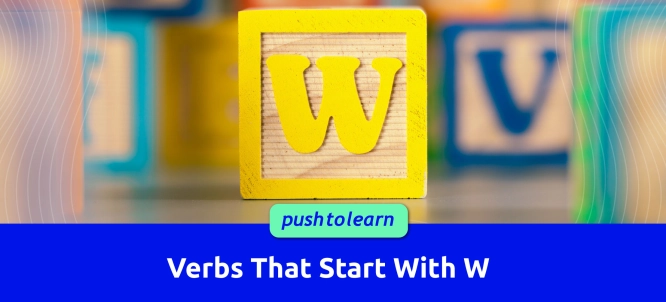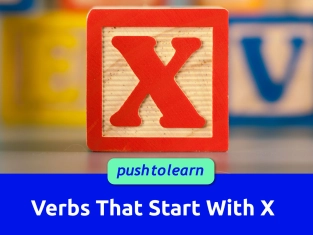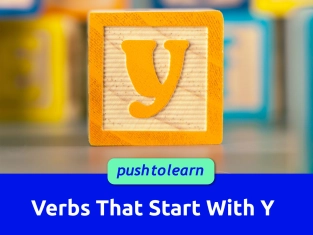by PushtoLearn
Verbs That Start With W
Table of Contents
Verbs That Start With W Exercises and Flashcards
These exercises focus on Verbs That Start With W
List of Top 50 Verbs That Start With W
|
Verb |
Definition |
Example |
|
Wade |
To walk through water or a similar substance. |
He had to wade through the muddy field. |
|
Wait |
To remain until something happens. |
She decided to wait for the bus inside. |
|
Waive |
To relinquish a right or claim. |
He waived his right to a jury trial. |
|
Wake |
To stop sleeping. |
She needs to wake up early tomorrow. |
|
Walk |
To move on foot. |
They like to walk in the park after dinner. |
|
Wander |
To move aimlessly without a fixed path. |
The tourists wandered around the city. |
|
Want |
To desire something. |
She wants to learn a new language. |
|
Warm |
To make or become warm. |
He warmed his hands by the fire. |
|
Warn |
To alert someone to danger or caution. |
The signs warned of slippery floors. |
|
Warp |
To bend or twist out of shape. |
The heat warped the wooden frame. |
|
Warrant |
To justify or necessitate something. |
The situation warrants further investigation. |
|
Wash |
To clean with water or other liquid. |
He washed his car on Saturday. |
|
Waste |
To use carelessly or without purpose. |
Don’t waste water while brushing your teeth. |
|
Watch |
To observe attentively. |
They watched the sunset from the balcony. |
|
Weaken |
To make or become less strong. |
The illness weakened his immune system. |
|
Wear |
To have clothing on the body. |
She decided to wear a blue dress to the party. |
|
Weave |
To interlace threads or materials. |
They weave baskets by hand. |
|
Wed |
To marry someone. |
The couple plans to wed next spring. |
|
Weep |
To cry or shed tears. |
She wept tears of joy at the good news. |
|
Weigh |
To measure the weight of something. |
He weighed the bag on the scale. |
|
Welcome |
To greet someone in a friendly manner. |
They welcomed the new students warmly. |
|
Weld |
To join metals by heating and melting them. |
He welded the broken part of the gate. |
|
Whack |
To hit something hard. |
He whacked the piñata with a stick. |
|
Whine |
To complain in a high-pitched tone. |
The child started to whine about bedtime. |
|
Whip |
To beat or strike quickly. |
She whipped the cream for the cake. |
|
Whisk |
To mix quickly with a whisk. |
He whisked the eggs for the omelette. |
|
Whisper |
To speak softly. |
She whispered a secret to her friend. |
|
Widen |
To make or become wider. |
They decided to widen the road for traffic. |
|
Wiggle |
To move with small, quick motions. |
The puppy wiggled its tail excitedly. |
|
Will |
To express determination or intent. |
She willed herself to finish the race. |
|
Wilt |
To droop or lose vitality. |
The flowers began to wilt in the heat. |
|
Win |
To achieve victory. |
Their team won the championship. |
|
Wink |
To close and open one eye quickly. |
He winked playfully at his friend. |
|
Wipe |
To clean or dry by rubbing. |
She wiped the table with a cloth. |
|
Wish |
To hope for something. |
He wishes for a better future. |
|
Withdraw |
To remove or take back. |
She withdrew money from the ATM. |
|
Wither |
To shrivel or fade. |
The plants withered from lack of water. |
|
Withhold |
To keep back or refuse to give. |
He withheld his approval for the project. |
|
Withstand |
To endure or resist. |
The building withstood the strong winds. |
|
Witness |
To see or observe an event. |
He witnessed the accident on his way to work. |
|
Wobble |
To move unsteadily. |
The chair wobbled on the uneven floor. |
|
Wonder |
To feel curiosity or amazement. |
She wondered about life on other planets. |
|
Woo |
To seek affection or approval. |
He tried to woo her with flowers and gifts. |
|
Work |
To engage in physical or mental activity. |
She worked hard on the project all day. |
|
Worry |
To feel anxious or troubled. |
He worried about the upcoming exam. |
|
Wrap |
To cover or enclose something. |
She wrapped the gift in colorful paper. |
|
Wreak |
To cause or inflict. |
The storm wreaked havoc across the region. |
|
Wrestle |
To grapple or struggle physically. |
They wrestled for control of the remote. |
|
Wring |
To twist something to remove liquid. |
She wrung the water out of the wet cloth. |
|
Write |
To mark words on paper or type electronically. |
She writes in her journal every evening. |

Featured Verbs Grouped by Topics
Daily Actions
-
Wash: To clean using water.
Example: "He washed his hands before dinner." -
Weigh: To measure weight.
Example: "The chef weighed the ingredients carefully." -
Work: To perform a task or job.
Example: "She worked diligently on her presentation."
Emotional or Abstract Concepts
-
Wonder: To feel curiosity.
Example: "He wondered about the mysteries of the universe." -
Worry: To feel anxious.
Example: "She worried about her friend’s safety."
Physical Movements
-
Wade: To walk through water or mud.
Example: "They waded across the shallow stream." -
Wrestle: To grapple or struggle.
Example: "He wrestled with the problem all night."
Creative or Productive Actions
-
Write: To put words on paper.
Example: "She writes poetry every weekend." -
Weave: To interlace materials or ideas.
Example: "The storyteller wove an intricate tale."
Everyday Use of Verbs Starting With W
-
Wait: "She waited patiently for her turn."
-
Watch: "They watched the fireworks display from the rooftop."
-
Wish: "He wished for a sunny day for their picnic."
-
Warm: "She warmed her hands by the fire."
-
Wrap: "He wrapped the package carefully."
Common Mistakes
1. Misusing “Weigh” Instead of “Measure”
-
Mistake: "He weighed the distance to the finish line."
-
Correction: "He measured the distance to the finish line."
2. Confusing “Warp” with “Wrap”
-
Mistake: "She warped the present."
-
Correction: "She wrapped the present."
3. Using “Worry” Instead of “Wonder”
-
Mistake: "He worried about the outcome of the story."
-
Correction: "He wondered about the outcome of the story."
4. Overusing “Will” for Future Actions
-
Mistake: "I will finish this soon."
-
Correction: "I plan to finish this soon."
5. Confusing “Withdraw” with “Withhold”
-
Mistake: "He withdrew the prize from the winner."
-
Correction: "He withheld the prize from the winner."
FAQ
What’s the difference between “Wade” and “Walk”?
“Wade” refers to walking through water or mud, while “walk” is a general term for moving on foot.
Example: "They waded through the marsh" vs. "They walked to the park."
Can “Weave” be used metaphorically?
Yes, it can mean combining ideas or elements.
Example: "She wove her experiences into a compelling narrative."
Is “Warp” always negative?
Not necessarily. While it often refers to damage, it can also imply creative bending, as in storytelling.
How is “Withdraw” different from “Withhold”?
“Withdraw” means to take something away after it’s been given, while “withhold” means to keep something back from being given.
Can “Wonder” be used as a noun?
Yes, it can also mean something amazing or extraordinary.
Example: "The pyramids are a wonder of the ancient world."
Explore other Verbs:

